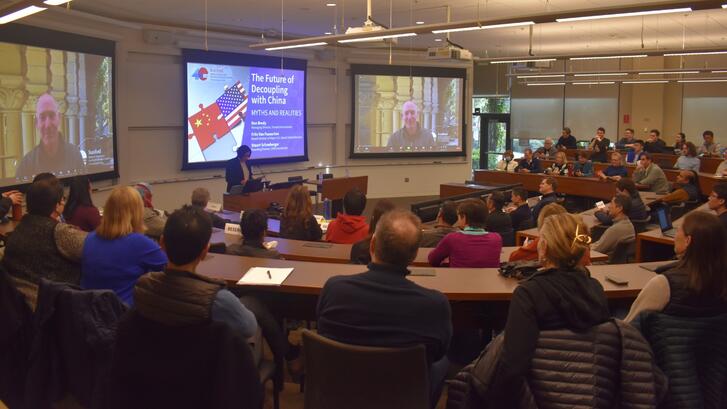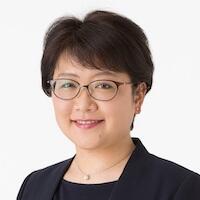A Perilous Crossroads: Deciphering North Korea's Escalating Belligerence
The Korean Peninsula stands at a perilous crossroads. Recent missile tests and provocations, coupled with historical trends, paint a worrisome picture of the current state of affairs, prompting some analysts to warn of a looming conflict. The Korea Program at Shorenstein APARC recently hosted two events to analyze these escalating tensions that have sparked global concern.
On February 21, the seminar “Slow Boil: What to Expect from North Korea in 2024,” featured Victor Cha, D.S. Song-KF Chair, Professor of Government at Georgetown University, and Senior Vice President for Asia and Korea Chair at the Center for Strategic and International Studies. Cha discussed historical behavioral patterns of North Korean missile tests, military provocations, and weapons demonstrations, and what all these might mean for security on the Korean peninsula.
The following week, on March 7, at the seminar “Is North Korea Preparing for War?,” we were joined by Robert Carlin, a non-resident scholar at the James Martin Center for Nonproliferation Studies, Middlebury Institute of International Studies at Monterey and Siegfried Hecker, a professor of practice at the James Martin Center for Nonproliferation Studies, Middlebury Institute of International Studies at Monterey, and in the Department of Nuclear Engineering at Texas A&M University. Carlin and Hecker, both formerly our colleagues at the Stanford Center for International Security and Cooperation, discussed their recent 38 North article, “Is Kim Jong Un Preparing for War?,” which posits that Pyongyang has already made the strategic decision to go to war.
The speakers at both events delved into the various rationales behind North Korea's actions and provided contrasting viewpoints on the trajectory of the situation. While Carlin and Hecker painted a grim picture of North Korea's intentions to engage in warfare and advocated for robust security measures, Cha argued that, while 2024 will be a challenging year, established approaches such as diplomacy and deterrence will remain effective in managing relations with Pyongyang.
Rhetorical Preparations for Conflict
Carlin and Hecker provided a grave assessment, suggesting that “Kim Jong Un has made a strategic decision to go to war,” akin to his grandfather's stance in 1950. Hecker provided historical context, indicating that despite attempts at normalization with the United States, each North Korean leader has simultaneously explored the development of its nuclear weapons arsenal and accumulation of its conventional armaments. Hecker argued, "The Korean War was never settled, it was an armistice, and so, more or less, North Korea has been preparing for war, but this is different and we are really concerned.”
Carlin noted a shift that occurred at the Workers’ Party plenum at the end of 2022, in which “Pyongyang announced new measures that demonstrated that the old policy with the U.S. was over and that they were going to move much more towards the Russians.” The plenum also marked a rhetorical shift where Kim Jong Un introduced the phrase “war preparations.” “Some people say, ‘Oh that's normal North Korean rhetoric’ — it's not normal. They had not been talking at that level to their own people about war preparations […] they talked a lot about deterrence which meant building up, but not war preparations,” said Carlin.
According to Carlin, Pyongyang has “primed the pan for a clash in the Yellow Sea […] everything we have seen in the last year suggests very strongly that this is a decision the regime has made, and that it will patiently move in this direction.”
The speakers both argued that Kim's shift stems from a perceived failure of past diplomatic endeavors and a traumatic setback at the 2019 Hanoi summit, when, as Hecker indicated, the North Koreans decided to abandon the 30-year policy of seeking normalization with the United States. “This is a more dangerous time than any time since the start of the Korean War,” Hecker warned.

The Inevitable Tensions of Deterrence
In contrast, Cha’s assessment of the situation is more cautiously optimistic, anticipating a surge in North Korean provocations in 2024 but attributing it to historical patterns rather than a definitive strategic shift. According to Cha, we should expect North Korean belligerence to increase in 2024, while dialogue looks unlikely.” He highlighted North Korea's tendency to ramp up provocations during U.S. election years, produced data on the increasing number of provocations since the 1990s, and emphasized Kim's repeated rejections of dialogue with the Biden administration.
Cha also provided four reasons why he does not expect a war with North Korea in 2024: “First, Pyongyang is not confident enough in its capability to deter U.S. and South Korean retaliation […] Second, the uptempo in U.S.-ROK and U.S.-ROK-Japan exercising […] Third, if North Korea were ready to go to war, they would not be selling all their ammunition to Russia […] and fourth, if North Korea were really ready to go to war, they would not be decoupling from South Korea.”
Cha suggested that, while war is unlikely, “coercion, particularly against South Korea, and North Korea-Russia relations are only going to grow.” He described North Korea’s transfer of armaments from Najin to Dunai in Russia to three munition storage facilities near the Ukrainian front. Cha sees a possible change in the U.S. North Korea policy approach from focusing on denuclearization to curtailing and disincentivizing this behavior.
An Uncertain Year Ahead
Whether or not the escalating tensions since the 2019 Hanoi Summit mean that Pyongyang is headed to war, its increased belligerence is a clear signal that Kim’s government has shifted its efforts. North Korea is now pursuing its security and economic agendas without any indication of attempting to normalize relations with the United States or South Korea. Furthermore, it continues to strengthen its partnership with the China-Russia bloc. The assessment of continued tensions on the Korean Peninsula is undisputed.
Ultimately, both perspectives shared by the speakers highlight the need for vigilance, strategic coordination, and innovative policy solutions to address the escalating tensions in the region.
Read More

Amid North Korea’s increasing provocations, APARC’s Korea Program hosted three experts — Robert Carlin, Victor Cha, and Siegfried Hecker — to consider whether Pyongyang plans to go to war.













![[Left] Graphic of missile, Taiwan flag, and China flag; [Right] Oriana Skylar Mastro](https://fsi9-prod.s3.us-west-1.amazonaws.com/s3fs-public/styles/727x409/public/hero/oriana_taiwan_munk_debate_hero.png?h=c4d9845d&itok=OXGfpqJ8)















